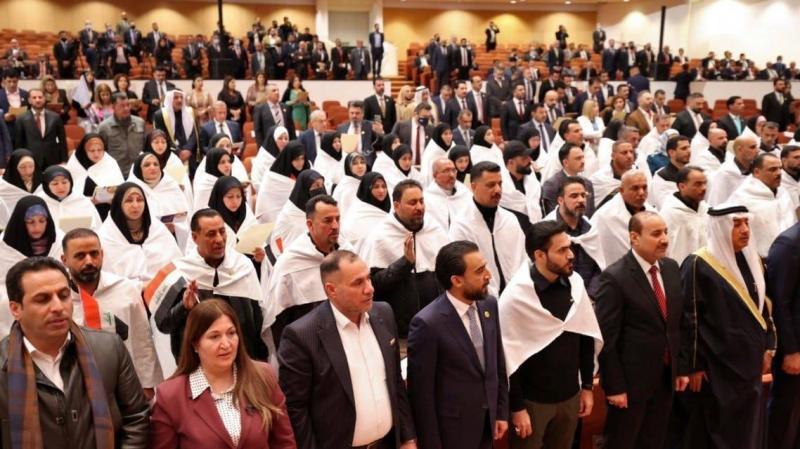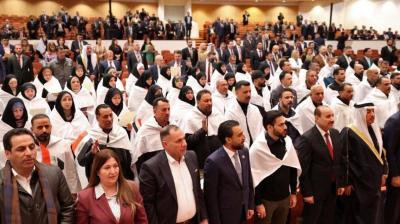The repercussions of the session held by the Iraqi parliament last Sunday continue in light of the "largest bloc," which is responsible for forming a new government in the country. In a statement early Wednesday, the "Coordination Framework," which includes Shiite parties and alliances (most of which are close to Iran and opposed to the Sadrist bloc), confirmed its intention to object to this bloc before the Federal Court, repeating the scenario that followed the parliamentary elections held months ago, which ultimately resulted in the Sadrist leader Muqtada al-Sadr's bloc topping the election results with 73 seats. The framework hinted at a "political and societal crisis that could hinder any government or parliamentary efforts to achieve the demands and aspirations of the people," as expressed in their statement. Will the disagreements within the "Shiite house" prolong the formation of a new government in Iraq?
There is no doubt that the ongoing political tussles overshadow the Iraqi political scene, following the clashes and chaos that characterized the first parliamentary session held three months after the early legislative elections, further complicating and obscuring the situation, leaving the fate of the government almost uncertain.
### Background of the Tension
The background of this tension has become clear to everyone: "Who holds the largest bloc" and thereby has the authority to designate the Prime Minister, the actual representative of the executive authority, which according to convention should be Shiite. While the Sadrist bloc, which won the largest number of seats, confirmed that it holds the largest bloc through alliances with Sunni components, especially the Progress coalition to which Parliament Speaker Muhammad al-Halbousi belongs, as well as the Kurdish bloc, particularly the ruling Kurdistan Democratic Party. In contrast, the Coordination Framework insists that it is the one that succeeded in forming the largest bloc through undisclosed alliances and has submitted "88 names," according to a source within the coordination framework.
### The Fate of the Government?
These disagreements have undoubtedly hindered the birth of the government and drawn numerous alarming scenarios about the possibility of violence and unrest on the ground. In Iraq, it has been customary for the government to emerge from the consensus of prominent Shiite parties. However, in a precedent, it seems this may not be achievable given the rift within the Shiite house with each party emphasizing that it has the upper hand in naming the Prime Minister. The insistence of both parties suggests prolonged waiting times as well.
Commenting on these developments, Iraqi political analyst Hamza Haddad explained that "the election of Halbousi on the first day indicates that Sadr," alongside Progress and the Kurdistan Democratic Party, "will work together in the future." He added, "theoretically, they could push to elect their candidate for the presidency and choose their candidate for the premiership." Additionally, he clarified that the nomination of the next Prime Minister "depends on the largest bloc; if the Sadrist movement presents a list of its deputies along with signatures from the Kurdistan Democratic Party and the Progress bloc, they would be the ones to nominate." He continued, "But if the matter remains confined to the Shiite house, then the Coordination Framework is the one that nominates the next Prime Minister."
### Further Instability?
Moreover, he noted that "unless both parties resolve their differences and move toward forming a single bloc, which other political parties would welcome to avoid further conflict, it is extremely difficult for one of the sides to quietly allow the other to monopolize the government formation without the other." Therefore, violence is not excluded in the upcoming period.
For her part, International Crisis Group researcher Laith Haighl pointed out that if the Sadrist movement succeeds in forming a majority government, or if the Coordination Framework manages to establish itself as the largest bloc, in either case, "the other party will not attempt to bring down the government through legal and political means, but will escalate violently." Additionally, Haddad considered that "the greatest fear remains the possibility of conflict between armed factions, as the Sadrists possess an armed faction, and the differing parties within the framework, especially the al-Fatah alliance, also have an armed faction."
It is noteworthy that since the election results were announced, al-Fatah, which experienced a significant decline in the elections (17 seats compared to 48 in the previous parliament), has pushed for the annulment of the results. Their supporters demonstrated for weeks in front of the Green Zone gates. Tension peaked when three drones attacked the Prime Minister's residence, but the judiciary returned to affirm the elections, confirming the previous results.




